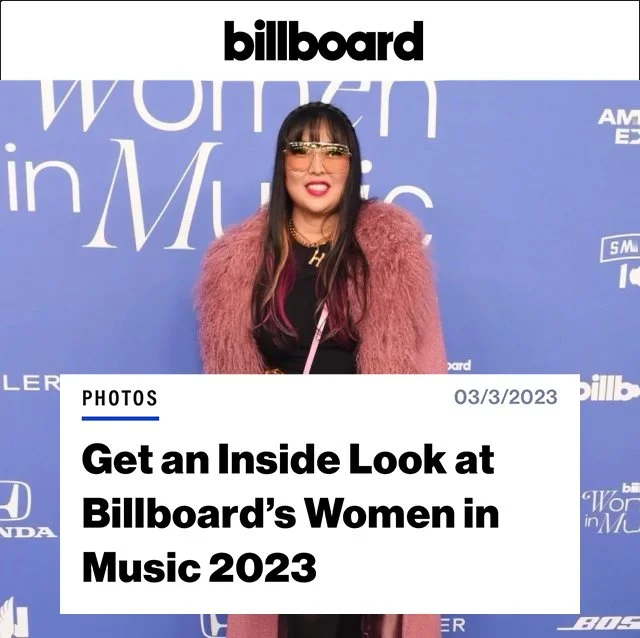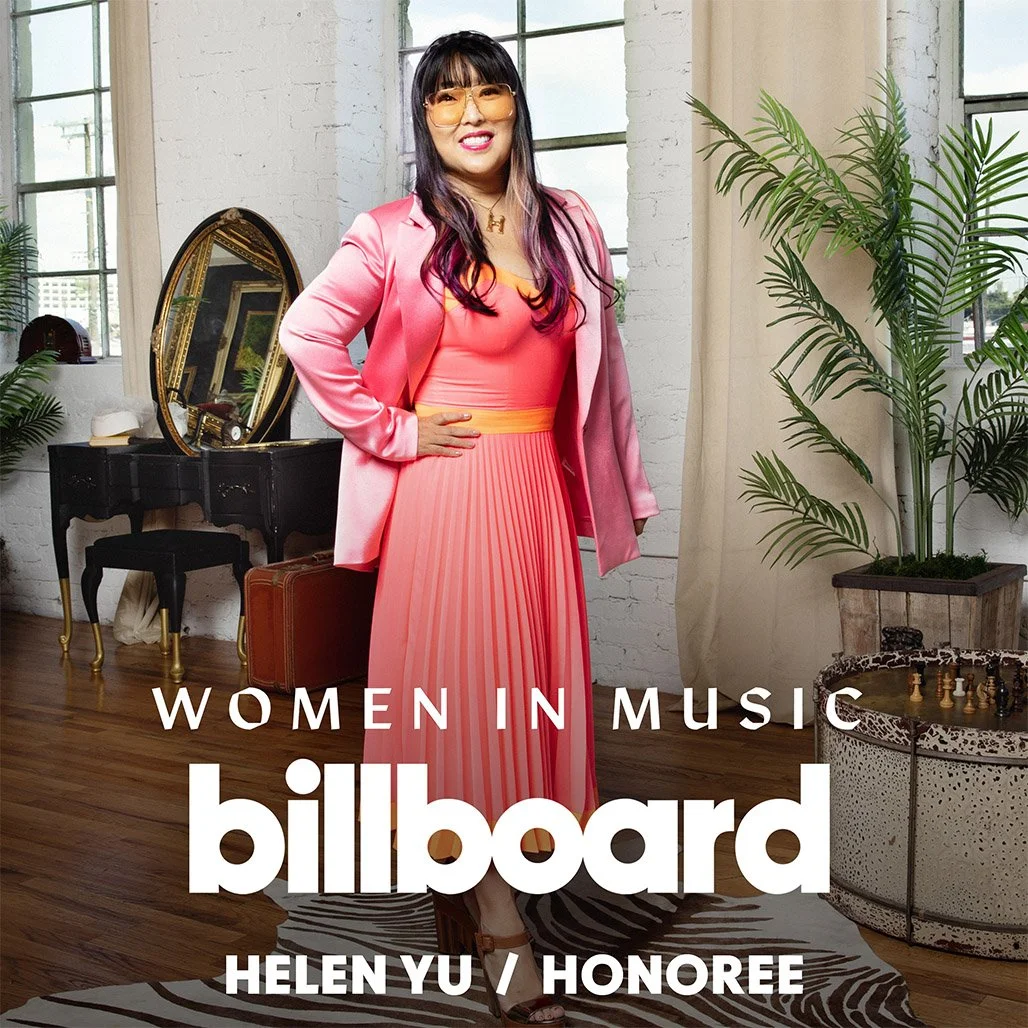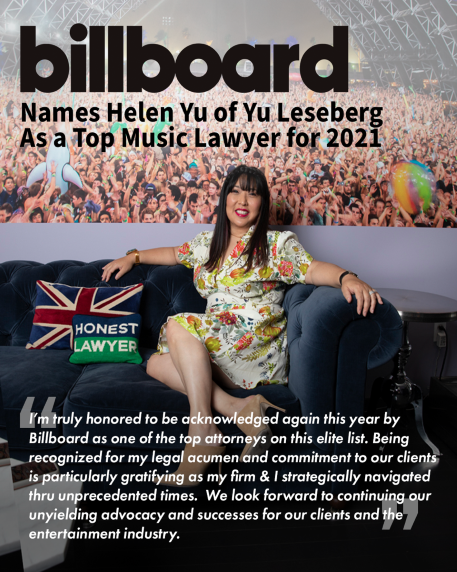Helen Yu, Esq. in her Hollywood office: "You don’t choose music, music chooses you."
Interview by Caitlin White of UPROXX.
Helen Yu Leseberg describes herself first and foremost as an advocate. As the found of her own entertainment law firm, Yu Leseberg, her priority is to serve and protect the legal well-being of “artists, songwriters, producers, and creative talent in the entertainment industry.” If anyone knows how difficult it might be to get artists to take care of and be familiar with their own legal rights, it’s Helen, who works at explaining high-level, analytic concepts to some of the most creative and non-linear artists currently working.
After an early stint as a high school intern for the now-defunct indie label Enigma Records, Yu Leseberg realized she could pair her love of the arts with her family’s mandate that she go to law school — and her career in entertainment law was born. Music law is just as complicated and unique as the rest of the industry, and in our conversation below she unpacks the challenges and considerations that go into working in the entertainment law field. Her final note resonates most: You don’t choose music, music chooses you.
How did you end up in your current role? What was your trajectory?
I always loved music and I started as a musician. I played keyboard and I was in a band in high school. Being in a band and being in music, of course I loved going to shows, and in high school I was able to get an internship at a label called Enigma Records. It was really early to start, I didn’t drive, I was 15, my mom would dropped me off. That’s how I started, and this label was an independent label and it was very cool. It was two brothers that owned it and they had all the departments there — radio, retail, distribution and finance. Everything was there. So I started off there in publicity. I learned working with a record company that way, and I did whatever they wanted me to do: answer phones, box stuff up, called stores. Back then we’d do a lot of data gathering by calling retailers to find out what records were selling. When I started in music for that first job, we didn’t have a lot of competing media. The internet didn’t exist. I’m surprised that millennials still want to work in the music industry, because there’s so many cooler jobs. But I started out with an internship, and most of my friends that work in the business almost all started with an internship.
So you met the Engima records guys at a show?
I was really lucky because I lived in LA and the entertainment industry is a cottage business here for us. The two guys that owned the label lived in my neighborhood. I was in a band and… I didn’t look like the other kids in the neighborhood. So I stood out, so they asked me ‘Hey, do you want to be an intern?’ And I didn’t know what that was, but I was like ‘Yeah!’
How did you move from working with a label into the law side of things?
I wanted to be a musician and be in a band, to have a creative career. But my family really discouraged it, because they thought that it was not a very stable career path. They wanted me to be a lawyer because they felt I had a higher likelihood of having a steady living. At the record company they had a lawyer so I had already thought ‘hmmm.’ The lawyer would come in and do things every once in awhile.
And at the time I was taking driving lessons — it’s funny, you never know where the inspiration is going to come from — I was learning how to finally drive so my mom wouldn’t have to continue to drive me down there anymore. This older hippie gentleman was my instructor, and he asked me ‘What do you want to be when you grow up?’ I told him I wanted to be in a band but my parents wanted me to be a lawyer. And he said ‘Well you know, there’s lawyers that do that.’ And I said ‘Yeah, you’re right, there’s lawyers that come in! They handle the musicians and all the stuff for the legal side. I think that really was it, it was a way to contribute to the arts and still kind of satisfy what my parents wanted.
Can you briefly explain what your main role is as an entertainment lawyer?
I’ve worked both in-house at record companies, and I now work in what we call private practice. I own my own firm now, and I’ve worked for other firms in the past. But in private practice mainly I represent talent. Meaning that I represent the artists and we negotiate their recording agreements, if they’re getting signed to a record company, whether it’s Universal, or whoever, we negotiate those recording agreements, we negotiate the publishing deals, we negotiate the tour agreements if they’re going out for live concerts, live tours. We oversee and master use and synchronization licensing.
Anytime you hear songs being used in television shows and in films, we help oversee that. Sometimes we directly license that if they don’t have a publisher, generally that’s the music publisher. We handle endorsement deals, where maybe Tanqueray or Samsung might want to get into business to have an artist as their spokesperson or to do commercial endorsements with that artist, we handle that. Any type of general releases, if they’re being interviewed on television or that kind of thing, we set up all their corporations, their personal loan-outs to render services to third parties. We do almost everything. But that’s generally what we do on a day-to-day basis for the artist.
What kind of skills do you think are good for someone who might be thinking about a job in music law?
You have to be very detail-oriented. You have to have a very high level of reading comprehension. You have to be a good writer, and be a good draft person. Those are the technical skills you need. The difference between and “and” and a “or” something in a sentence is huge. You can’t say “this or that” or “this and that,” the difference is enormous. If you miss one zero it’s the difference between 10,000 and 1,000. You can’t make mistakes, so you have to check and you have to re-check and you have to be very detail-oriented. Even where you put your punctuation, where does that comma go in that sentence can make the sentence have a different meaning.
How is music law different from practicing other kinds of law?
Music law is like being on a different planet. It’s a different skill set. It’s almost like, it’s contracts, it’s copyright, it’s intellectual property, but there’s so many things that are custom and practiced in the business in the way things are done that are so unique to the business it’s almost like a trade. You can’t really graduate from law school and then just start being a music lawyer. Because there’s so many things that you don’t know. You can’t possibly learn, even if you read about it. It’s literally analogous to going and having an apprenticeship, becoming a journeyman or being an electrician or something.
How did you handle that transition?
I had been able to get an internship during law school at Motown Records. And then once I graduated I was able to get a job working in the legal department at Virgin Records. In a very low-level position there in the legal department, and I just started learning, kind of from the bottom.
What do you think the hardest part of your job is?
The hardest part of my job, honestly, is number one managing the expectations of the clients. It’s hard dealing with talent, especially high-level talent. You have to be able to deal with a certain type of personality, because artists are unusual. They’re temperamental. They think in a very non-linear terms, and you have to be able to explain very linear, analytical, difficult concepts to people who are creative who naturally think in non-linear terms. The better of an artist they are, the less linear of a thinking pattern they have. [Laughs] Then, there’s also the fierce competition. There’s a lot of competition, even among the attorneys themselves. There’s ego, there’s all of that stuff. It’s an extremely competitive field.
On the other end of the spectrum, what is one of the most triumphant moments in your career?
There’s so many… I don’t know if I have one watershed moment that I feel is really the pinnacle. But maybe one of the most difficult things I’ve done is I resolved an incredibly important and difficult copyright case that was multi-jurisdictional that no one had been able to solve and resolve with a famous UK rockstar for almost forty years. Many lawyers had come before me and tried over an almost forty year period. There was a BBC documentary about it, and I was able to resolve it. It was pretty amazing.
What advice do you have for someone who might be looking to get into music law?
If you want to get into music law, stay the course. Be dedicated to it. When you go to law school and graduate, your first job leads to your second job leads to your third job etc. So if you go to school and you’ve got all these student loans — it’s expensive because it’s graduate school — it may take you longer to land that first job in music and entertainment, but you’ve got to say the course. If you take a job at this bankruptcy firm thinking you’re going going to switch later, and it’s just a job for now, it’s not going to happen. Because when you go to get that music job, they’re going to ask what experience you have. So you’ll start going down this other path. You’ve got to stay really passionate and stay the course. Music is a community and I think it’s a great community to be part of because it is about passion. This is one of these fields… where it chooses you. Music chooses you, you don’t choose music.
Learn more about Helen’s entertainment and music law firm Yu Leseberg here.


































